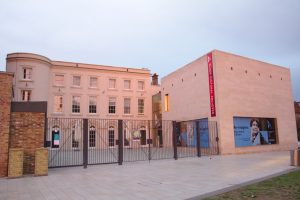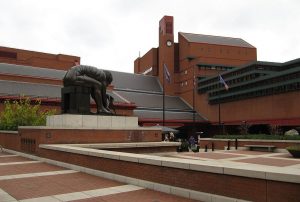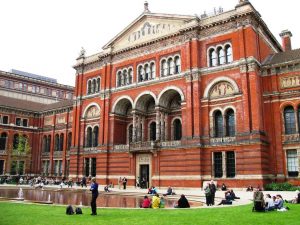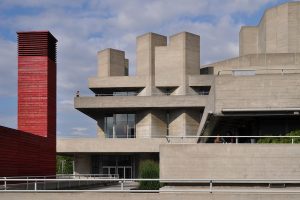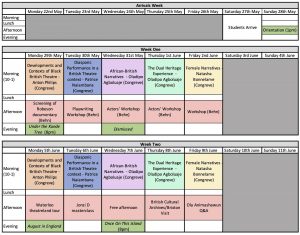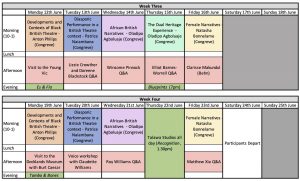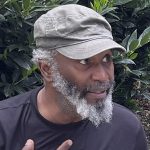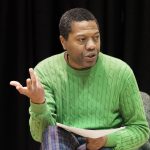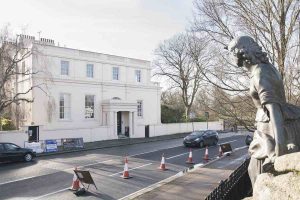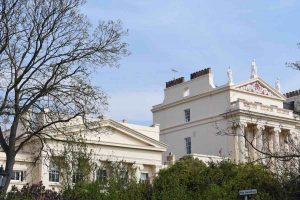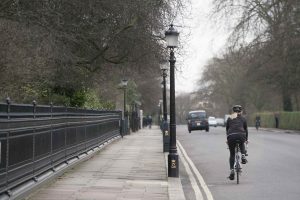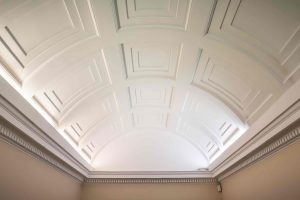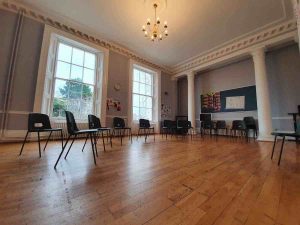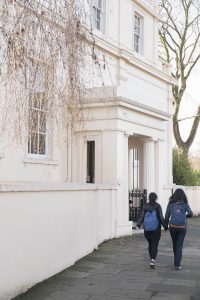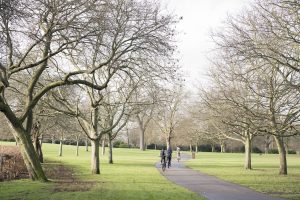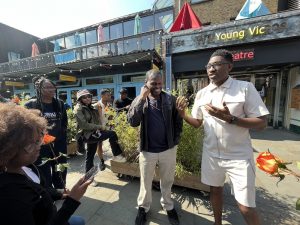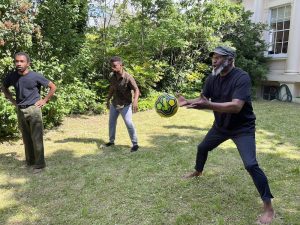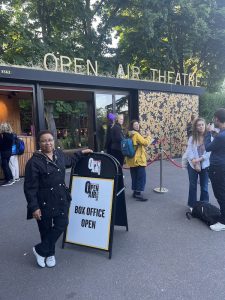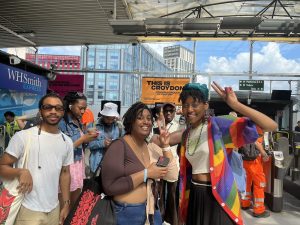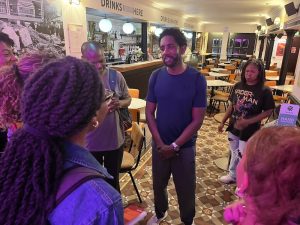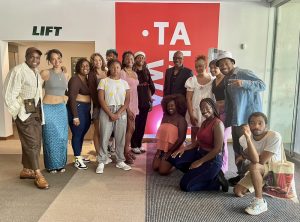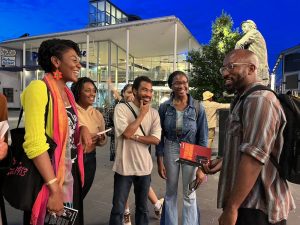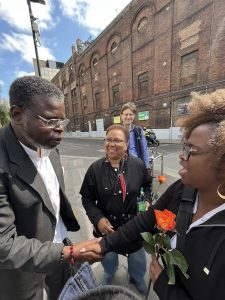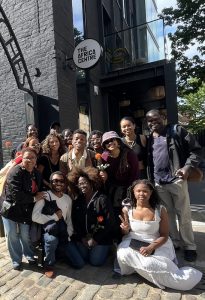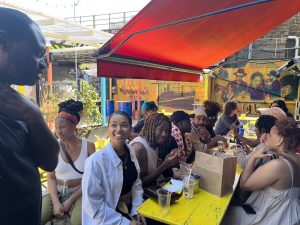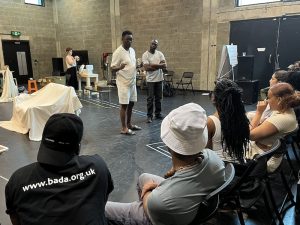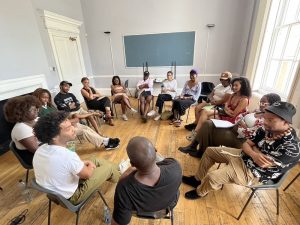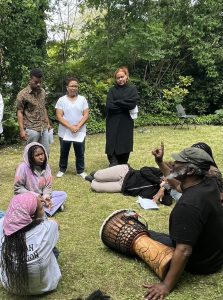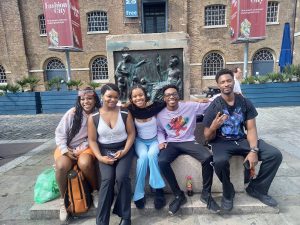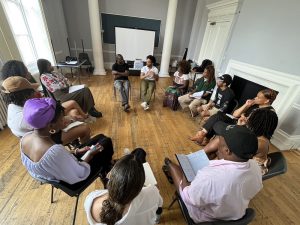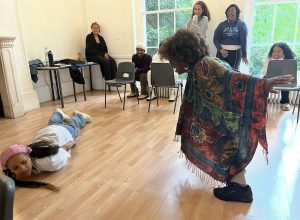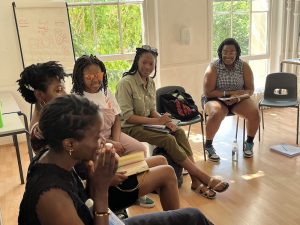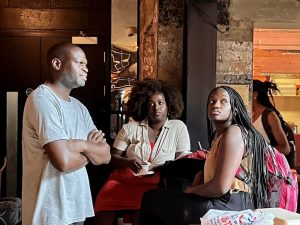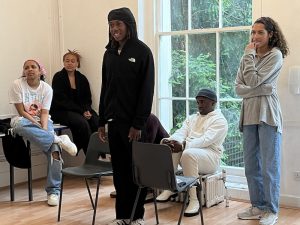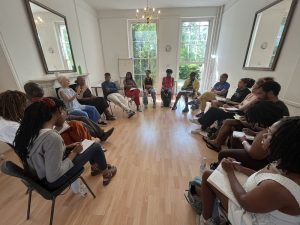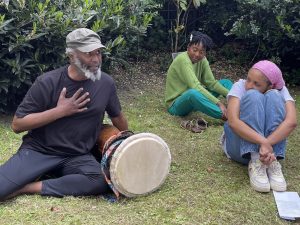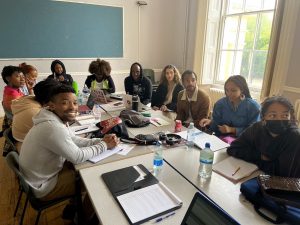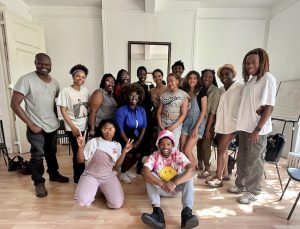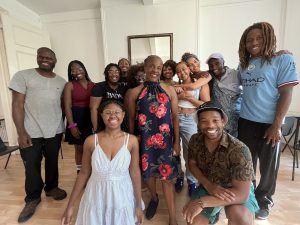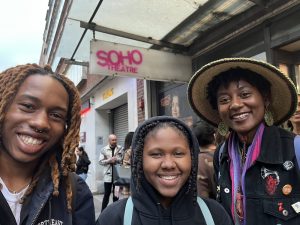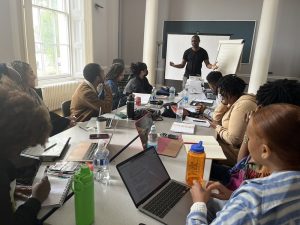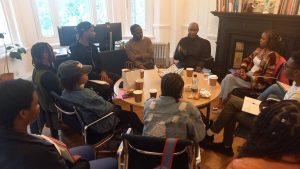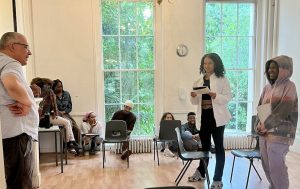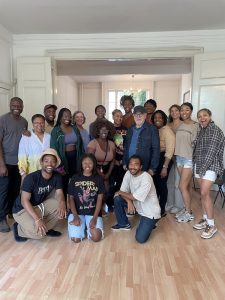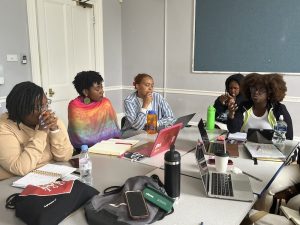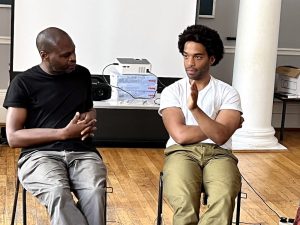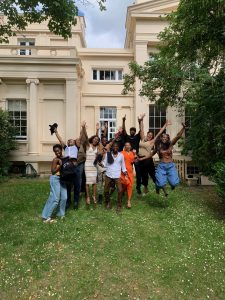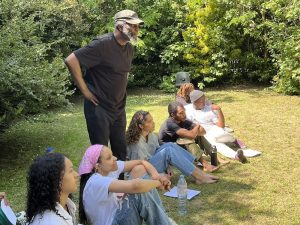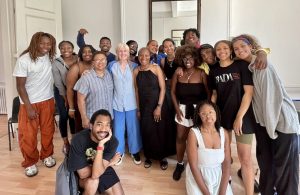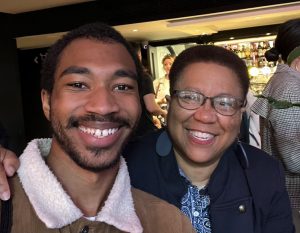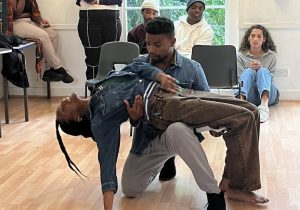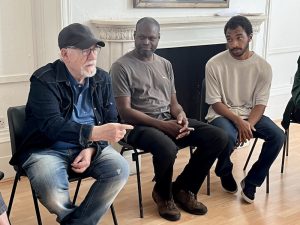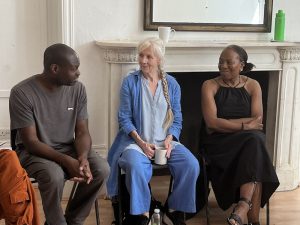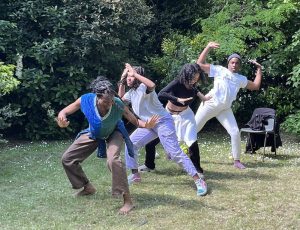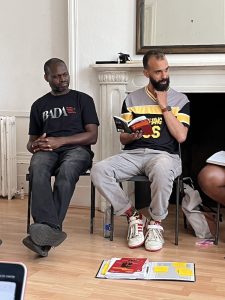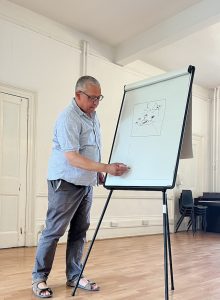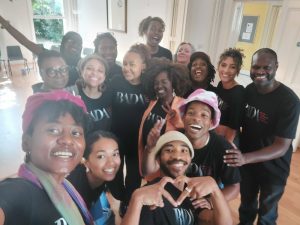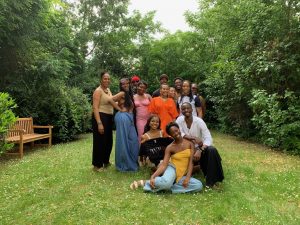BLACK BRITISH THEATRE AND PERFORMANCE
BADA’s four-week Black British Theatre and Performance course provides an overview of contemporary Black British theatre and performance. Play texts by major Black British Writers such as Roy Williams, Winsome Pinnock and debbie tucker green, will be analysed from social and cultural contexts framed by theories of identity, representation, nationalism, race, gender, sexuality and class.
There will be twice-weekly theatre trips to watch performances at venues such as The National Theatre, Bush Theatre, Arcola Theatre and the Royal Court Theatre. There will also be visits to places of relevance to broaden the contexts of the course, such as The Black Cultural Archives, Talawa Theatre Company, The V&A Museum, and a theatre-focused tour of London by Black History Walks.
The work of the course is evenly divided between academic work in the classroom and practical work/masterclasses in the studio. It appeals to a wide range of applicants from the undergraduate to the graduate level and to professionals at any stage in their career.
The analytical modules will be taught by academics, directors and writers from the field of Black Theatre Studies. The practical element, which makes up for half of the course will be taught by directors, writers and dramaturgs, along with practitioners from the productions seen in the twice weekly visits.
The practical elements and analytic work will complement and feed into each other, building on and bringing together the various elements.
Although there is no direct actor training offered, as an area of study it will build on any actor’s training.
Sign up for our Black British Theatre and Performance mailing list for news, announcements, and application reminders.
-
Applications for the 2025 Black British Theatre and Performance Program are now closed. To enquire about any available late spaces please contact course director Oladipo Agboluaje on oagboluaje@bada.org.uk.
Your application to Black British Theatre and Performance includes:
- Application Form
- Proposal (approximately 500 words): Tell us why you would like to attend this course.
- Academic/Professional Recommendation
- Resume
If you would like to be notified when applications open, please sign up for our Black British Theatre and Performance mailing list.
-

Oladipo Agboluaje
Course DirectorThis course presents an exciting opportunity for participants to learn about and experience Black British theatre and performance. We will analyse key playtexts that dramatise the Black-British experience as well as identify their dramaturgical and aesthetic underpinnings. There will be visits to places of interest and to performances that will support our understanding of the environment in which these plays are developed. We shall invite key professionals to shed light on their practice and to offer insight into the practicalities of working in the British theatre industry. -
This course provides an overview of Black British theatre by tracing the social, cultural, intellectual and political developments that have come to define the theory, practice and aesthetics of its practitioners. The course will interrogate how Black people have been represented on stage by White writers before plays by Black theatre practitioners began to gain greater visibility on the British stage. Early work by C.L.R James’ The Black Jacobins will introduce the participant to the anti-colonial aspect of Black British writing. The course will then trace the concerns of early black writers of the seventies like Mustapha Matura and Michael Abbensetts up to the writers of the present day.
We shall analyse key texts that exemplify representations of the Black British experience against notions of Britishness. We shall draw out the confluence of influences from Africa, the Caribbean and the United States and immigration trends to illustrate the diasporic, hybrid nature of Black British theatre and how these influences shape identity and representation through the lens of multiculturalism. The course will map the dominance of writers of Caribbean descent post-Windrush to the growing visibility of writers of African descent. By doing so, the course shall expose participants to seminal writings on British culture and history with which to contextualise the plays that will be studied.
A practical component of the course will introduce participants to contemporary practitioners including, writers, actors, directors, artistic directors through workshops and talks. Apart from theatre visits to see relevant plays, participants will visit sites of interest including The Black Cultural Archives, The George Padmore Institute, The British Library, The V&A Archive, The National Theatre Black Plays Archive, Talawa Theatre Company.
-
Key Dates 2025
7th June Participants arrive in London 9th June Course starts 4th July Course ends 5th July Participants depart
Sample Programme Schedule
-
Classes include
- Developments and Contexts of Black British Theatre led by Anton Phillips: will examine the development of theatre in Britain as performed by people of the African Diaspora. The course will survey the different contributions of practitioners from Africa, the Caribbean and America. It will chart Black British theatre’s rise through the contributions of its practitioners, theatre companies in the face of political and social changes.
- Female Narratives led by Natasha Bonnelame: starts by contextualising and situating the development of black women playwrights and black theatre companies with a gender specific remit. It locates the arrival of radical young black female artists in the 1980s, and examines their determination to challenge their absence from the mainstream. This period is the foundation for the rest of the course which interrogates the works of contemporary female Black playwrights and black female theatre companies looking at their concerns, influences and performance styles as distinct from their male and white female counterparts.
- The Dual Heritage Experience: looks at the work of writers like Mojisola Adebayo and Lynette Linton to understand how the experience of Britons of dual heritage is explored in their work.
- African-British Narratives led by Oladipo Agboluaje: explores the growing presence of black playwrights of African descent like Inua Ellams and Bola Agbaje. It shall look at how these writers and Black African-led theatre companies like Tiata Fahodzi and Utopia theatre are influencing the definition of what it means to be Black British.
- Diasporic Performance in a British Context led by Patrice Naiambana: uses Shakespeare’s Othello as a catalyst text to create an African Diasporic performance. Within this performance paradigm, students will study voice/text analysis, story-making, working as an ensemble, body, voice and rhythm awareness.
Work Expectations
In addition to in-class acting and academic work and out of class preparation, participants will submit and present additional work drawing from the theatre visits, site visits, Masterclasses and in-class conversations.- Theatre Reports (8 total)
- Research Project
-
Other faculty to be announced.
Schedules permitting, we will be joined by the following artists for workshops and masterclasses during the course.
-
The course is open to everyone.
This course appeals to a wide range of applicants from the undergraduate to the graduate level and to professionals at any stage in their career. Applicants aged 18 must have at least one year’s experience away from home to be considered for this course.
Although there is no direct actor training offered, actors are encouraged to apply as this area of study will build on any actor’s training.
The 2025 Black British Theatre and Performance Program fees are: $7,550 ** Should you wish to arrange your own accommodation for the duration of the course then the reduction in the course fee will be $1,650. Participants must confirm on acceptance whether they wish to make their own accommodation arrangements or use that arranged by BADA. Due to the high demands for accommodation in London during the summer months, we cannot guarantee that rooms can be made available should a later decision be made to take up the offer of accommodation booked through the course.
Program fees include tuition, all excursions (theatre trips, site visits, museum admission and tours, etc.), required books/scripts and accommodation while on the course.
All fees are payable in US dollars. Please contact Acting Finance Director Helen Ainsworth at hainsworth@bada.org.uk should you wish to settle the fees in UK Sterling so that an appropriate rate can be agreed.
On acceptance, in order to hold their place, applicants will need to pay a non-refundable deposit of $500 and indicate whether they wish to make their own accommodation arrangements or use those arranged by BADA.
The remaining fees are due as follows:
Friday 21 March 2025 $2,700 Friday 11 April 2025 $2,700 Friday 2 May 2025 $1,650* Fees become non-refundable on the due date.
* The balance due on May 2nd for those opting to arrange their own Accommodations is $0.
Please note, in addition to the fees payable to BADA, participants are responsible for:
- Roundtrip Airfare to the UK
- Meals
- Insurance
- Spending money
Spending habits obviously vary widely between participants, but London is an expensive city. We recommend a minimum of £150 ($190) a week for food, laundry and transport if you mostly prepare your own food and use only public transport. Regular coffees, takeaways, meals out or use of cabs can quickly push the cost of subsistence and transport up beyond £200 ($250) per week.
Black British Theatre and Performance Program Refund Policy
A deposit of $500 is required on acceptance, which is non-refundable. The balance of fees payable fall due as stated above and become non-refundable on those dates.
If the programme is canceled by BADA due to circumstances beyond our control, all fees, with the exception of the application fee, will be refunded. BADA accepts no responsibility for personally incurred expenses such as flights or pre-booked ground transportation.
Financial Assistance
Limited awards from the BADA scholarship fund are available to assist accepted applicants in defraying the costs of attending BADA’s summer programmes. These awards are based on need and merit.
Before applying to the program, please note the fees and consider how you will fund the experience should you be accepted. Only a very small number of applicants accepted to the summer 2025 programs will be chosen to receive scholarship funding from BADA. Awards could be a small as a few hundred dollars. Most accepted applicants will need to provide their own funding.
If you would like to discuss the possibilities of receiving scholarship funding prior to submitting an application, please feel free to contact our Summer Programs Admissions Coordinator, Jennifer Rockwood: jrockwood@bada.org.
uk. Note: Fees for BADA’s summer programmes are not eligible for payment under the federal loan system nor do they qualify as higher education expenses under the 529 plan as they are not credit bearing. Unfortunately, BADA is not in a position to assist in the retention of any additional outside grant or loan assistance.-
Facilities
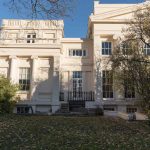 BADA’s Black British Theatre and Performance course takes place in an historic Crown Estate building in one of London’s most prestigious residential areas which is home to a number of national embassies and ambassadorial residences.
BADA’s Black British Theatre and Performance course takes place in an historic Crown Estate building in one of London’s most prestigious residential areas which is home to a number of national embassies and ambassadorial residences.Inside BADA you will find a full range of facilities including 6 teaching spaces, each named after a different playwright, a Library, a collection of recorded performances, and a private Green Room for participants to relax or study in-between classes.
There are also designated computer and printing facilities for participants and wireless internet connection available throughout the building.
BADA is located beside the beautiful Regent’s Park, perfect for walks between classes and springtime picnics. BADA’s location offers easy access to the theatres in London’s West End and it’s only a short walk from Camden Town, famous for its bustling markets, coffee bars, health food stores, art house cinemas and distinctive shops.
BADA also lies close to Primrose Hill (home to many actors, directors, writers and other celebrities) and the perfect place to get a panoramic view across London.
-
Accommodation in London will be shared twin rooms at the Stay Club North Acton. Further details on accommodation will be sent to you as part of pre-arrival materials.
-
BADA is not an accredited US institution; we are unable to provide academic credit for the course.
With its intensive workload, 88 contact hours and 40 further unsupervised work hours, this programme has a suggested credit equivalency of two 3 credit courses, in line with other programmes BADA runs. You will finish the programme with a portfolio of work, and the course director can provide a written assessment for your home institution.
Classroom and Coursework breakdown by hours
88 Hours of contact time
Classroom time – 60 hours
Masterclasses – 16 hours
Visits & Tours – 12 hours40 hours of unsupervised work
Theatre Trips – 24 hours
Report on each theatre show we see – 8 x 2 = 16 hours -
Hear what some of our Participants have to say about their time on the course:
Kimberly Harding Ahdis Beruk Zadrian Smith

